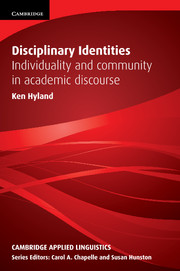Book contents
- Frontmatter
- Contents
- Series editors’ preface
- Preface
- Acknowledgements
- Notes on corpora and abbreviations
- 1 Identity: Interaction and community
- 2 Discipline: Proximity and positioning
- 3 Investigating identity
- 4 Identity in representational genres
- 5 Self-representation in academic bios
- 6 Culture: Authority and visibility
- 7 Reputation: Individuality and conformity
- 8 Gender: Disciplinarity and positioning
- 9 Identity, disciplinarity and methodology
- Appendix: Items with potential metadiscourse functions
- References
- Name Index
- Subject Index
6 - Culture: Authority and visibility
Published online by Cambridge University Press: 09 February 2023
- Frontmatter
- Contents
- Series editors’ preface
- Preface
- Acknowledgements
- Notes on corpora and abbreviations
- 1 Identity: Interaction and community
- 2 Discipline: Proximity and positioning
- 3 Investigating identity
- 4 Identity in representational genres
- 5 Self-representation in academic bios
- 6 Culture: Authority and visibility
- 7 Reputation: Individuality and conformity
- 8 Gender: Disciplinarity and positioning
- 9 Identity, disciplinarity and methodology
- Appendix: Items with potential metadiscourse functions
- References
- Name Index
- Subject Index
Summary
I have argued that identity results from the command of an ‘idiom’, or mastery of a community repertoire, which we appropriate and shape to our own needs and personal proclivities. We locally construct an identity through relationships between the self and community, what I have called proximity, and through relationships between the self and the message, or positioning. The former ties us into the collective through the social and discursive practices of a discipline and the power relations these draw upon. The latter refers to the ways individuals employ these resources to express a distinctive point of view, a personal ‘take’ on what is being discussed. One emphasises conformity and the other difference, but both are essential to effective communication and to the individual’s claim to be taken seriously as a credible member of a discipline.
Proximity and positioning generally work in tandem but not always in concord. This is because while we can successfully express our evaluations and stances towards topics only using the language our disciplines accept as logical and persuasive, we may not always feel comfortable in using those forms. The ‘self’ that is inscribed in academic discourse is unfamiliar and strange to community newcomers and novices who often feel a conflict in the identity they are portraying using these prescribed conventions. However, while all students have to adapt themselves to the requirements of academic ways of thinking and seeing, practices which require writers to adopt the role of an autonomous, rational mind resolving the inconsistencies of the world, this can appear particularly alien to those educated in other traditions of knowledge.
This chapter takes up this key identity issue by exploring how Hong Kong students use and experience academic writing in English. Taking first-person mention as one way of expressing subjectivity in texts, and recognising the contested nature of ‘culture’, I examine how prior learning experience can influence constructions of identity. First, though, I will outline something of how students can experience academic conventions and the potential impact of their wider culture on this.
Student experiences of academic conventions
Student discourse, and particularly writing, is at the heart of teaching and learning in higher education.
- Type
- Chapter
- Information
- Disciplinary IdentitiesIndividuality and Community in Academic Discourse, pp. 123 - 146Publisher: Cambridge University PressPrint publication year: 2012

